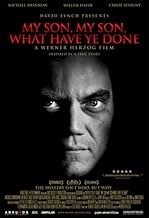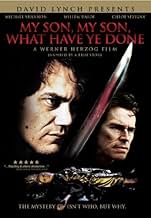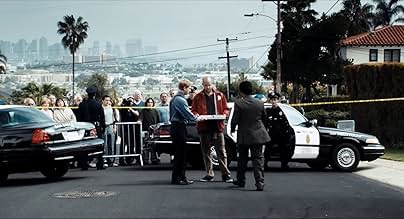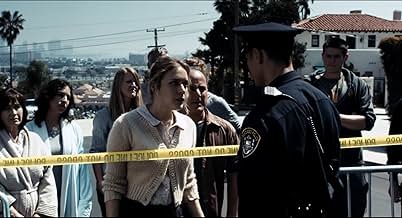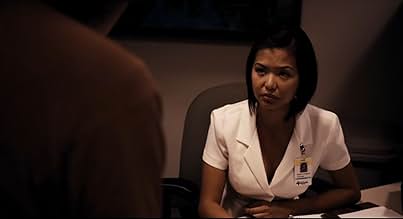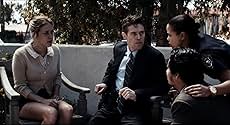Inspired by a true crime, a man begins to experience mystifying events that lead him to slay his mother with a sword.Inspired by a true crime, a man begins to experience mystifying events that lead him to slay his mother with a sword.Inspired by a true crime, a man begins to experience mystifying events that lead him to slay his mother with a sword.
- Director
- Writers
- Stars
- Awards
- 2 nominations total
Irma P. Hall
- Mrs Roberts
- (as Irma Hall)
Julius Morck
- Phil
- (as Julius Mørck)
- Director
- Writers
- All cast & crew
- Production, box office & more at IMDbPro
Featured reviews
OK, maybe you have to be a Herzog fan to get this one. In its small and quiet way it's a classic Herzogian study of visionary madness and obsession, played out this time with mordant irony against the blandness of suburban San Diego. Brad, a brooding man-child who lives with his mom, gradually goes nuts, saying and doing increasingly unhinged (and funny) things to his clueless loved ones, played by goofy character actors like Udo Kier, Grace Zabriskie and Chloe Sevigny. Willem Dafoe plays the equally clueless detective called in when Brad, inevitably, explodes in a single (off-screen) act of violence. All the usual Herzog flourishes are here, though often played small: odd animals, oddball people, grimly threatening nature, useless bureaucratic procedures, civilization and its hapless inhabitants struggling to maintain order and etiquette in the face of the world's natural madness, violence and chaos. It's a wacky, Herzogian comedy of manners, very much in the tradition of many of his films from Dwarfs through Stroszek to Grizzly Man. If you like Herzog you'll probably like it; if not, maybe not.
A compelling look into one man's slow decent into madness. Brilliantly directed and featuring a stellar cast, - including Willem Dafoe and Micheal Shannon - this film is both horrible and fascinating. It concerns a man whom, after acting in and becoming obsessed with a Greek play, chooses to do that which his character does; kill his mother with a sword used as a prop in the production. Although it cites David Lynch as producer, it's unclear what the director's actual involvement was with the film. The viewer gets the idea that Herzog is more paying homage to Lynch then anything. Watching this film is like watching a train wreck; it feels awkward and odd, but for some reason, you can't look away. I'd recommend this film for any Herzog or Lynch buff (the reference to 'Blue Velvet' is worth it) and anyone who likes bizarre, horror films. Otherwise, the average movie-goer might find this film pretentious and boring.
Of all the films I saw at the 2010 Edinburgh International Film Festival, this is the only one (apart from Savage Messiah) that deserved, for me, repeated viewings. I'm not implying it's the best ever Werner Herzog film. Or the best David Lynch film (if you feel his 'producer' role influenced it that much, as many did.) But I was captivated by what 'My Son' had actually done. Even though it is obvious from the start. Less obvious though is the Greek tragedy playing out in his mind which, in his head, is mostly what he's actually doing. Apart from that, I wanted to re-watch so many scenes. Crazy stuff that is made believable simply by the conviction with which it is presented. The first viewing had me gripping my seat in open-jawed amazement throughout, only to breathe a sigh at the end and wonder what I was getting so excited about. Flamingo hostages? Give me a break! (Even if you are supposed to call them 'eagles in drag.' Or ostriches.) God is in the kitchen. On a tin of oatmeal to be precise. But this isn't comedy (though you may laugh) and consider, if you will, that, "The cruel bitch of female passion can break apart the yolk that joins a pair; and force apart the dark embrace of beast and man alike."
Now we're getting somewhere, and it's hypnotically arty, fiendishly funny, upsettingly evocative of nasty dread around the corner, and aren't you pleased that dreams are only dreams and this is only a film.
Story One. The Truth.
The film is based on the true story of Mark Yavorsky, a San Diego man who stabbed his mother to death, inspired by his recent role as Euripides' Orestes in a production of The Eumenides at University of California, San Diego. Or was it Aeschylus' version. Or maybe it was Electra, by Sophocles. (The Truth isn't very interesting anyway, so you can skip this bit.)
Story Two. The Cinematic Truth.
Brad McCullum (Michael Shannon) is maybe in his late twenties but lives with his eccentric and overbearing ("You know you like your jello!") mother. Brad adores mum (played by Grace Zabriskie) with a Norman Bates –like unhealthy shine. This being a Herzog movie, it goes with saying that he's crazy, although the line between 'crazy' and 'madly inspired actor-artiste' is deliberately nebulous. He is engaged to a very normal girl (played by Chloë Sevigny, whose characters do seem to specialise in dubious boyfriends, don't they?). Their shared passion for theatre somehow makes this believable. Willem Dafoe and Michael Peña are bizarrely and beautifully caricatured Lynch-style detectives for whom the unusual is just another day's work. Rather more interesting for them is a tale of the plain clothes policeman getting busted for speeding by another plain clothes policeman. They're about as normal as the blood-related cops in Tarantino's Deathproof. If a murder won't fit on the report sheet, it will by the time they've finished with it. They are also about the sanest thing we've got short of lovesick Sevigny or an exasperated theatre director.
So Brad doesn't get to kill mum on stage cos he's far too 'inspired' to be managed by the director and gets kicks off the cast. He runs the stage sword (which is meant to be Greek but isn't, because Brad prefers it that way) through his mother several times as they are sitting down for morning coffee with their nice neighbours. This occurrence is treated in a fairly routine way near the beginning of the film, so we can enjoy the rest of the time in extended flashbacks to understand what really happened and why.
Story Three. The Real Truth.
Orestes (with whom Brad identifies) is the last link in a bloody line of godly nastiness. Tantallus had been hard done by, and invites the gods to dinner to see if they are real. When they turn up, he serves his son in a stew (They didn't have jello in ancient Greece). The gods puke, but the bits of half-chewed flesh live on to father more cannibals. Only Orestes can lift the curse, but has to kill his mother to do it. If that sounds crazy, it probably was. But Orestes is something of dramatic symbol for anyone whose crime is mitigated by extenuating circumstances. Mad or not, you do what you have to do. "At least some people act a role," says Brad, "others play a part." Historically, it's about replacing matriarchy.
This is a film where you are entranced throughout, awaiting the dark brooding fury or the mother's 'vengeful hounds from hell.' (Or at least an ostrich that steals yours glasses while you're cleaning them.) It even has a dwarf. At the end, you might wonder what on earth you were getting so worked up about, but it's hard to deny you enjoyed the ride. Analyse it too closely and you might not like the extended freeze frames which are ludicrously pretend (you can see Sevigny moving, understandably, as she tries to eat her horrid jello). I did, but for someone people who spotted it the first time round, the joke had worn off. For others, it might be a re-hashing of Lynch/Herzog staples without breaking radical new ground. I suspect I may have to change my 'rating' to five stars if I slink back and see it yet again.
Now we're getting somewhere, and it's hypnotically arty, fiendishly funny, upsettingly evocative of nasty dread around the corner, and aren't you pleased that dreams are only dreams and this is only a film.
Story One. The Truth.
The film is based on the true story of Mark Yavorsky, a San Diego man who stabbed his mother to death, inspired by his recent role as Euripides' Orestes in a production of The Eumenides at University of California, San Diego. Or was it Aeschylus' version. Or maybe it was Electra, by Sophocles. (The Truth isn't very interesting anyway, so you can skip this bit.)
Story Two. The Cinematic Truth.
Brad McCullum (Michael Shannon) is maybe in his late twenties but lives with his eccentric and overbearing ("You know you like your jello!") mother. Brad adores mum (played by Grace Zabriskie) with a Norman Bates –like unhealthy shine. This being a Herzog movie, it goes with saying that he's crazy, although the line between 'crazy' and 'madly inspired actor-artiste' is deliberately nebulous. He is engaged to a very normal girl (played by Chloë Sevigny, whose characters do seem to specialise in dubious boyfriends, don't they?). Their shared passion for theatre somehow makes this believable. Willem Dafoe and Michael Peña are bizarrely and beautifully caricatured Lynch-style detectives for whom the unusual is just another day's work. Rather more interesting for them is a tale of the plain clothes policeman getting busted for speeding by another plain clothes policeman. They're about as normal as the blood-related cops in Tarantino's Deathproof. If a murder won't fit on the report sheet, it will by the time they've finished with it. They are also about the sanest thing we've got short of lovesick Sevigny or an exasperated theatre director.
So Brad doesn't get to kill mum on stage cos he's far too 'inspired' to be managed by the director and gets kicks off the cast. He runs the stage sword (which is meant to be Greek but isn't, because Brad prefers it that way) through his mother several times as they are sitting down for morning coffee with their nice neighbours. This occurrence is treated in a fairly routine way near the beginning of the film, so we can enjoy the rest of the time in extended flashbacks to understand what really happened and why.
Story Three. The Real Truth.
Orestes (with whom Brad identifies) is the last link in a bloody line of godly nastiness. Tantallus had been hard done by, and invites the gods to dinner to see if they are real. When they turn up, he serves his son in a stew (They didn't have jello in ancient Greece). The gods puke, but the bits of half-chewed flesh live on to father more cannibals. Only Orestes can lift the curse, but has to kill his mother to do it. If that sounds crazy, it probably was. But Orestes is something of dramatic symbol for anyone whose crime is mitigated by extenuating circumstances. Mad or not, you do what you have to do. "At least some people act a role," says Brad, "others play a part." Historically, it's about replacing matriarchy.
This is a film where you are entranced throughout, awaiting the dark brooding fury or the mother's 'vengeful hounds from hell.' (Or at least an ostrich that steals yours glasses while you're cleaning them.) It even has a dwarf. At the end, you might wonder what on earth you were getting so worked up about, but it's hard to deny you enjoyed the ride. Analyse it too closely and you might not like the extended freeze frames which are ludicrously pretend (you can see Sevigny moving, understandably, as she tries to eat her horrid jello). I did, but for someone people who spotted it the first time round, the joke had worn off. For others, it might be a re-hashing of Lynch/Herzog staples without breaking radical new ground. I suspect I may have to change my 'rating' to five stars if I slink back and see it yet again.
A man, Brad Macallum, murders his mother and then holes up in a house with two hostages. During the standoff the police piece together what lead to this turn of events.
This movie initially looked very interesting, Directed by Werner Herzog, starring Michael Shannon, Willem Dafoe, Chloe Sevigne and Michael Pena and with an intriguing start, the potential was there for an intense, gripping psychological drama.
However, it was not meant to be. The plot meanders, the intrigue wears off very quickly, Macallum's motives aren't explained very well and the whole thing just feels superficial and empty. Despite the great cast, the performances feel very stagey and overly melodramatic.
Disappointing.
This movie initially looked very interesting, Directed by Werner Herzog, starring Michael Shannon, Willem Dafoe, Chloe Sevigne and Michael Pena and with an intriguing start, the potential was there for an intense, gripping psychological drama.
However, it was not meant to be. The plot meanders, the intrigue wears off very quickly, Macallum's motives aren't explained very well and the whole thing just feels superficial and empty. Despite the great cast, the performances feel very stagey and overly melodramatic.
Disappointing.
Based on a true story where a young man with mental illness is involved in an old play about a man who kills his mother, who then kills his mother. The police are called and the man holds up in his house with two hostages while the police surround and try to begin negotiations. At this point the film appears like it will focus on this but instead we get a story constructed of flashbacks which mostly come from the perspective of Brad while also get nothing from him in the present. The flashbacks involve some that appear relevant (his experiences in Peru, his involvement in the play) and others than have no context (Brad wandering round China). The police action and interviews outside the house form the structure for all this but while in another version they would be the "all", here they seem to exist almost like a necessary evil.
I say this because the film seems much more interested in the flashbacks and in particular using them as a tool to bewilder, set a very strange tone and generally make the viewer feel on-edge. It does this very well and even stories which seem relevant are given a weird tone. This matches most interaction with Brad in the film, he is intense, makes no sense and his anger is often as sudden and unjustified as the moments that give him peace. I guess that the goal was to replicate the inside of his mind, of the delusions and the feelings that within himself make perfect sense but to everyone else is either bewildering or frightening or a combination thereof. If this is the goal then it is achieved and the only remaining problem is that achieving this goal is not the same as making the film work – perhaps it could have been but in this case it is not.
The structure doesn't allow us to experience Brad's mind, if anything it puts us in the minds of the police who have shown up from the outside. As such we think we know the score (because we have seen this genre like they have done this job) but yet what we then experience not only doesn't fit this expectation, but ultimately we are left none the wiser in terms of our understanding; the man and the crime remain an enigma with only the very obvious link to the play's themes being the "reason" (if there even is such a thing approaching that word). It is frustrating in this regard.
The delivery is mostly good but doesn't make it worth it. As director Herzog delivers lots of striking images and scenarios but I felt myself constantly pushed away by the heavy use of music – most of it caterwauling to my ears. It seemed to be trying to present a profundity that wasn't there (which I guess is how it appeared to Brad) but all it did was grate and alienate, because again I was already on the outside – the music just made the walls higher and the gates stronger. Shannon is great though – he has a marvelous intensity that he brings to each role and it is just a shame that the film doesn't help him much. He did a similar role recently in Take Shelter, where the film tried to bring us into his mental illness – that one did that much more effectively than this. Dafoe, Sevigny, Kier, Zabriskie, Hall, Peña and others all provide solid support and add the sense of a deep cast, but they are just structural supports for a film which prepares the base well but seem to have much to actually hold it together from there. That said, I did like that so many of them linked to other films from Herzog, Lynch or both.
It is a shame because it is rare to find myself so pushed away by Herzog as I was here. This is not to say that I always "get" him, but usually what he is doing has enough of interest and curiosity behind it that even when I'm outside his shop, he still draws me to put my nose against the window. But here it seemed deliberate to push me away, to prevent me understanding and I'm sure that was not the goal, just the side effect of the method of trying to achieve the goal.
I say this because the film seems much more interested in the flashbacks and in particular using them as a tool to bewilder, set a very strange tone and generally make the viewer feel on-edge. It does this very well and even stories which seem relevant are given a weird tone. This matches most interaction with Brad in the film, he is intense, makes no sense and his anger is often as sudden and unjustified as the moments that give him peace. I guess that the goal was to replicate the inside of his mind, of the delusions and the feelings that within himself make perfect sense but to everyone else is either bewildering or frightening or a combination thereof. If this is the goal then it is achieved and the only remaining problem is that achieving this goal is not the same as making the film work – perhaps it could have been but in this case it is not.
The structure doesn't allow us to experience Brad's mind, if anything it puts us in the minds of the police who have shown up from the outside. As such we think we know the score (because we have seen this genre like they have done this job) but yet what we then experience not only doesn't fit this expectation, but ultimately we are left none the wiser in terms of our understanding; the man and the crime remain an enigma with only the very obvious link to the play's themes being the "reason" (if there even is such a thing approaching that word). It is frustrating in this regard.
The delivery is mostly good but doesn't make it worth it. As director Herzog delivers lots of striking images and scenarios but I felt myself constantly pushed away by the heavy use of music – most of it caterwauling to my ears. It seemed to be trying to present a profundity that wasn't there (which I guess is how it appeared to Brad) but all it did was grate and alienate, because again I was already on the outside – the music just made the walls higher and the gates stronger. Shannon is great though – he has a marvelous intensity that he brings to each role and it is just a shame that the film doesn't help him much. He did a similar role recently in Take Shelter, where the film tried to bring us into his mental illness – that one did that much more effectively than this. Dafoe, Sevigny, Kier, Zabriskie, Hall, Peña and others all provide solid support and add the sense of a deep cast, but they are just structural supports for a film which prepares the base well but seem to have much to actually hold it together from there. That said, I did like that so many of them linked to other films from Herzog, Lynch or both.
It is a shame because it is rare to find myself so pushed away by Herzog as I was here. This is not to say that I always "get" him, but usually what he is doing has enough of interest and curiosity behind it that even when I'm outside his shop, he still draws me to put my nose against the window. But here it seemed deliberate to push me away, to prevent me understanding and I'm sure that was not the goal, just the side effect of the method of trying to achieve the goal.
Did you know
- TriviaMany of the cast and crew on Bad Lieutenant: Port of Call New Orleans (2009) reunited with director Werner Herzog to produce this film. Major examples include actors Michael Shannon, Brad Dourif and Irma P. Hall, cinematographer Peter Zeitlinger, and editor Joe Bini.
- GoofsIn the escalator scene, which takes place in Calgary but which was filmed at the San Diego Convention Center, one can clearly see a row of palm trees outside.
- Quotes
Brad Macallam: [referring to his flamingoes] What do you mean by birds? They're my eagles in drag!
- ConnectionsFeatured in At the Movies: Venice Film Festival 2009 (2009)
Details
- Release date
- Countries of origin
- Language
- Also known as
- Benim Güzel Oğlum, Ne Yaptın Sen?
- Filming locations
- Production companies
- See more company credits at IMDbPro
Box office
- Budget
- $2,000,000 (estimated)
- Gross worldwide
- $76,739
- Runtime1 hour 31 minutes
- Color
- Sound mix
- Aspect ratio
- 1.85 : 1
Contribute to this page
Suggest an edit or add missing content

Top Gap
By what name was My Son, My Son, What Have Ye Done (2009) officially released in India in English?
Answer


